|
|
UPDATE ON PROJECTS UNDERWAY
|
|

|
|
|
Two Projects Completed in Northern Israel
|
|
|
|
In January 2014, WRAP undertook its fourth and fifth projects in tandem, a rain barrel harvesting system at two schools in northern Israel. The first, Tuba Zangaria, is a middle school serving 387 Arab Israeli/Palestinian boys and girls located in Tuba Zangaria, a Bedouin village with a population of 6,500. The second, Eynot Yarden, is a middle school serving 430 Jewish boys and girls located on a kibbutz in Eynot Yarden of the Galil Elion region, population 20,000. The schools, in close proximity to one another, are part of a joint environmental education program aimed at increasing trust between Jewish and Arab Israeli/Palestinian youth through the common goal of protecting their shared environment.
At Tuba Zangaria, the rainwater system provides water to the school toilets. It is operating successfully, and as part of the environmental education program, the students have planted a school garden. The students are taking ownership over the program, and the teachers and parents hope that their students can provide a bridge between the Arab and Jewish communities in the region. The Eynot Yarden High School students are using the harvested rainwater for a variety of purposes including aquaculture and hydroponics. Harvested water is also used for toilet flushing at the school.
|
|
|
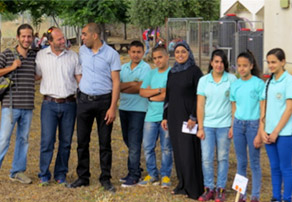
|
|
WRAP partners along with school principal, science teacher, and students in front of rain barrels at Tuba Zangaria |
|
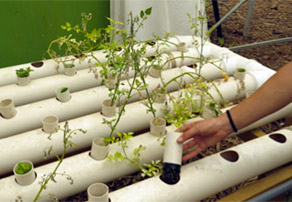
|
|
Hydroponics experiment uses collected rainwater at Eynot Yarden |
|
|
|
|
|
Sur Baher Participates in Joint Field Trip at Lod
|
|
|
On June 9, students from Sur Baher (WRAP's pilot school) participated in a joint field trip at the Farm School in Lod, Israel alongside students from a diverse set of schools throughout the region. The collaborative activities for the day focused on agriculture, irrigation, and principles of water conservation, while promoting cross-cultural interaction amongst the students.
|
|
|
The field trip was a culmination of efforts initiated in partnership between the Rotary Clubs of Lod, Israel and Coral Springs-Parkland, Florida, also responsible for funding the rainwater harvesting system sited at the Farm School.
|
|
|
|
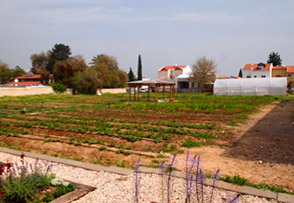
|
|
Fields at the Farm School, Lod, Israel |
|
|
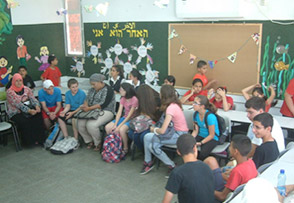
|
|
Students gather during joint field trip |
|
|
|
|
|
Spring 2014 Trip Report
|
|
|
|
Malcolm Siegel, Ph.D., WRAP Director for Operations and Education, visited all of the schools supported by WRAP in May 2014. This included visits to Sur Baher Girls School and Al Afaq School in East Jerusalem, Battir Girls School in the West Bank, and WRAP's newest project schools, Eynot Yarden and Tuba Zangaria in Northern Israel.
|
|
|
The students and staff who met with Dr. Siegel represent a cross-section of the populations in the region: Arab students in the West Bank and East Jerusalem, Bedouins from the Galilee and Jewish students on a kibbutz.
|
|
|
|
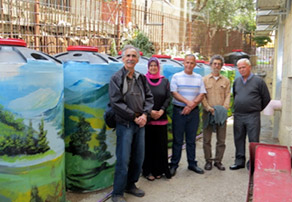
|
|
Dr. Malcolm Siegel with teachers and school administrators at Sur Baher |
|
|
|
In Sur Baher, the WRAP system is used in a network of environmental education activities with other East Jerusalem Schools. At the Al Afaq School, the environmental program has had an important impact on the community. It provides a sense of accomplishment and hope to both the students and their parents, who continue to face enormous challenges in their personal lives. The school staff and students continue to build an impressive environmental garden and activity center. In Battir, in the West Bank, Dr. Siegel met with representatives from our partner organization, EcoPeace Middle East, and learned how WRAP's work at the Battir Girls School supports the Good Water Neighbors program of that organization. As described above, the new projects at the schools in the Galilee, Tuba Zangaria and Eynot Yarden are helping to provide a framework for students from Bedouin and Jewish populations to meet and see beyond the stereotypes that have kept them apart in the past.
|
|
|
Looking to the future, Dr. Siegel met with staff from the Ministry of Education of Israel who work in schools in Jaffa and Jerusalem to identify potential partners for WRAP's future efforts.
|
|
|
|
 |
|
|
|
This year, WRAP welcomed its newest Board Member and two interns!
|
|
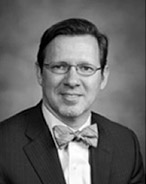
|
|
Brent Fewell, Partner, Environmental and Natural Resources Practice at Troutman Sanders LLP, is the newest member of the WRAP Board of Directors. Prior to joining Troutman Sanders, Mr. Fewell was a senior vice president for environmental health and safety at United Water, Inc., a subsidiary of Suez Environnement, an international waste and water company. Prior to his time in private industry, he was the principal Deputy Assistant Administrator for the Office of Water at the Environmental Protection Agency (EPA). Mr. Fewell's background with water issues in government and private industry, both domestically and internationally, strengthen the Board's commitment to improve water quality and availability for underserved populations in the Middle East.
|
|
|
|
|
|
During 2014, WRAP also welcomed its newest interns Caitlyn Nalder and Brooke Larson who work with our partner organization, the Albuquerque Academy Desert Oasis Teaching Garden. Ms. Nalder's background is in intercultural peacebuilding and conflict transformation. She is trained in Arbinger Facilitation—a global consulting firm specializing in improving organizational culture and conflict transformation. Ms. Nalder has spent time volunteering in the Middle East with Peace Players International, an organization that brings children together from communities in conflict to play basketball.
|
|
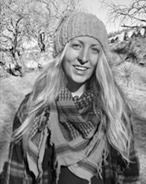
|
|
|
|
|
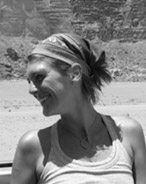
|
|
During the summer of 2014, Ms. Larson, a student and activist in and out of Jerusalem, worked with students at the Albuquerque Academy and in 2015 plans to help coordinate the group's partnerships with schools in Israel and Palestine. Her background is in creative writing with a particular focus in the intersection of ecology, language arts, and peacebuilding. Ms. Larson is a wilderness guide and educator for the ANASAZI Foundation, a non-profit wilderness therapy program in Arizona's Sonoran Desert that serves to restore family relationships by cultivating ties to the natural world.
|
|
|
|
|
To read our new members' full bios, visit http://www.wrapdc.org/who-we-are/.
|
|
|
|
 |
|
|
|
WRAP has partnered with a number of U.S. university student groups on various initiatives this year and into the new year.
|
|
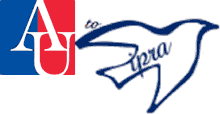
|
|
WRAP was among the supporters of American University's 2013 Water, Cooperation, and Peace practicum from its outset. The group researched, collected data, and conducted field studies at project sites within Israel and the Palestinian West Bank. The students presented the results of this research, also captured in the group's 2013 report, at the August 2014 Water and Conflicts panel at the International Peace Research Association (IPRA) Conference in Istanbul, Turkey. To view the presentation, click here.
|
|
|
WRAP has been working with a group of students from the University of Maryland through the Change the World Campaign. Change the World matches students with nonprofits for semester-long consulting projects. A team of five MBA students with a faculty advisor is working on a long-term strategic planning project for WRAP.
|
|

|
|

|
|
Finally, WRAP looks forward to partnering with an undergraduate student group from the University of Chicago's Green Economics Group (GEG). GEG is a student research group dedicated to exploring the intersections of the environment, business, economics, and public policy. The group will collaborate with WRAP on a project related to operations and education at existing WRAP schools to strengthen the long-term sustainability of the rainwater systems and educational programs.
|
|
|
|
 |
|
|
|
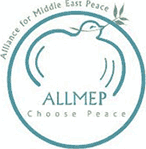
|
|
In November 2014, WRAP was accepted as a member of the Alliance for Middle East Peace (ALLMEP), a consortium of organizations focused on people-to-people coexistence and cooperation among Israelis, Palestinians, Arabs, and Jews. The organization works in the U.S. and internationally to increase visibility and resources for members in the Middle East. ALLMEP convenes events to bring together NGO leaders, policymakers, pro-Israel and pro-Palestinian activists, diplomats, private foundations, and the media to learn about and support grassroots peace efforts.
WRAP looks forward to working with the ALLMEP membership towards our shared goals.
To learn more about ALLMEP visit, http://www.allmep.org/.
|
|
|
|
 |
|
|
DESERT OASIS TEACHING GARDEN
|
|
|
|
|
|
|
WRAP is partnering with the Albuquerque Academy Desert Oasis Teaching (DOT) Garden on shared environmental education projects. The DOT Garden cultivates resilience in individuals and the community by inspiring action today and seeding hope for tomorrow. The DOT Garden teaches ecological restoration and food production gardening; implements and evaluates desert-adapted agriculture; unifies the power of innovative technologies with the strength of New Mexico's diverse cultural heritage; and demonstrates respect and reverence for nature and humanity.
The collaboration with the Academy involves students from classes in biology, environmental studies, and Arabic language. During 2014, the Academy students posted Arabic language translations of their biographies, and a similar webpage for the biographies of students from the Sur Baher Girls School was established. In the future, this shared online space will provide a place for the students from the WRAP schools to interact with each other and with students from the United States.
|
|
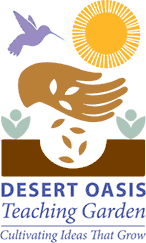
|
|
|
For more information, visit http://www.thedotgarden.org/ and http://desertoasisgarden.wordpress.com/.
|
|
|
|
 |
|
|
Al-Sedeeq School in the West Bank
|
|

|
|
WRAP is very close to its funding goal for its next West Bank project. The project would be a cistern rainwater system installation and educational program at the Al-Sedeeq Primary School in the Village of Husan in the West Bank. The student body at Al-Sedeeq is made up of 389 Arab boys. The school's primary source of water is currently the unreliable municipal water network, and because of this, the school experienced over 30 days of restroom closures due to water shortages last year.
|
|
|
The system WRAP proposes to install at Al-Sedeeq would collect rainwater from the roof of the school, divert it into a large cistern (underground, concrete storage tank), and pump it to the school's toilets for flushing. The cistern holds up to 62,000 liters of rainwater, greatly reducing the school's cost for water and vulnerability to an unreliable municipal water source. The project would help to ensure continued usage of clean restrooms throughout the entire school year and the possibility for summer classes and community gardening.
|
|
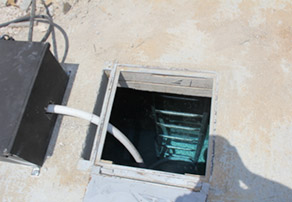
|
|
The cistern planned for Al-Sedeeq will be similar to the cistern installed by WRAP at the Battir School, West Bank, pictured |
|
|
|
WRAP and its local partner, EcoPeace's Bethlehem Office would be responsible for all facets of constructing the cistern, employing the routine maintenance schedule, and continued coordination with the school's leadership and staff to implement the environmental education program.
|
|
|
This anticipated project will become a reality due to generous contributions provided by the April Fund, Firedoll Foundation, and the Jerusalem Fund for Education and Community Development.
|
|
|
|
|
|
 |
|
|
Rotary Hands Across Waters Program
|
|
|
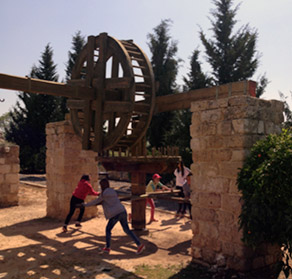
|
|
Students participate in hands-on activities during a field trip to one of Israel's ancient water wells |
|
|
|
|
|
WRAP is a proud supporting partner of the Rotary Hands Across Waters program, a collaboration between a growing number of domestic and international Rotary Clubs, spearheaded by the Rotary Club of Coral Springs-Parkland, Florida and the Rotary Club of Haifa, Israel, and implemented by the Hi-Teach Water & Knowledge Program. The initiative builds upon the successful partnership established in 2010 between the Rotary Club of Coral Springs-Parkland, FL and the Rotary Club of Lod, Israel to utilize principles of water conservation within schools as a platform for promoting social interaction between various ethnic and religious communities throughout Israel.
|
|
|
The program is underway in three anchoring institutions in Lod – the Ha Mapilim School, Agricultural Learning Center (Farm School), and Ganey Aviv School – each of which have rainwater harvesting systems installed. Students from these schools and an additional ten schools will engage in joint field trips and ongoing educational activities with the goal of building cross-cultural ties through shared learning of pertinent water-related topics, including agricultural irrigation, water reclamation, and water desalination.
|
|
|
To learn more about this program, visit www.handsacrosswaters.org.
|
|
|
|
 |
|
|
Expanding Efforts into Jordan
|
|
|

|
|
Visitors tour the Sharhabil Bin Hassneh EcoPark in Northern Jordan |
|
|
|
|
|
WRAP is working to expand its network of schools to improve access to sanitation and advance environmental stewardship and education in underserved communities of Jordan. A collaboration between WRAP, EcoPeace's Amman, Jordan Office, and local community organizations has been established to work towards this goal. The program would construct rainwater harvesting systems at the Lenticular Secondary School for Girls in Al Adaseya, Jordan, the Sweileh High School for Girls in Sweileh, Jordan, and the Sharhabil Bin Hassneh EcoPark in the Northern Jordan Valley.
|
|
|
A parallel environmental education program would complement each system, engaging students in hands-on monitoring and reporting of system data, offering lessons about environmental science, water stewardship, and conservation. The system installation and its accompanying environmental education program would build upon the EcoPark's current efforts to preserve and promote ecologically important habitats. Furthermore, the project would facilitate field trips to the EcoPark for the students of the Lenticular and Sweileh Schools, connecting the educational curriculums and exposing the students to broader and more tangible environmental concepts.
|
|
|
Stay tuned as this exciting effort progresses!
|
|
|
|
 |
|
|
For My Earth Project
|
|
|
|
The "For My Earth" (FME) Environmental E-Book is a program at the Anderson School of the University of New Mexico that will publish e-books featuring stories about kids involved in environmental projects. WRAP is exploring this partnership to bolster communication around environmental education at our project schools and as a fundraising vehicle to support educational activities. Look for the first publication sometime in the summer of 2015. The e-books will be available from WRAP as well as distributors such as BookBaby.
|
|
|
|
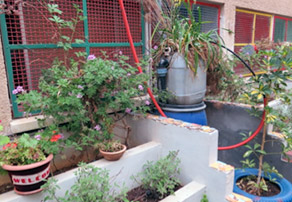
|
|
Stories like the Sur Baher school's use of grey water for gardening would be shared within the FME book |
|
|
|
For more information about the For My Earth project, visit http://www.formyearthproject.com/.
|
|
|
|
 |
|
|
Strengthening Environmental Education
|
|
|

|
|
Science experiments at Sur Baher |
|
|
|
|
|
In addition to putting new projects on the ground, WRAP continuously strives to strengthen the educational programming at its existing partner schools. WRAP has been working with school faculty and administrators to identify priority needs for each school to bolster their environmental education programs.
|
|
|
For the Sur Baher school, WRAP will provide water testing kits so the students may conduct additional science experiments related to water quality. WRAP is working with staff at the Al Afaq School to design environmental education programs for students with special needs. For instance, student activities might include authoring comics about environmental principles or creating and distributing Water Saver Magnets to strengthen the culture of water conservation both at the school and within each student's home.
|
|
|
WRAP is continuing to raise funds to assist the Battir School with constructing a learning garden in the courtyard that surrounds the cistern that WRAP constructed last year. The garden would be a key component of the environmental education curriculum and would provide students a safe outdoor space.
|
|
|
An important element in our environmental education and peacebuilding program is the development of joint education projects involving several schools in Israel, Palestine, Jordan, and the United States. The first program in that effort is the collaboration between the Albuquerque Academy Desert Oasis Teaching Garden and the Sur Baher Girls School described above. Finally, also described above, WRAP will partner with the For My Earth Project to produce E-books about the schools that we work with. The books will provide a focus for environmental activities and proceeds from sale of the books will go towards additional environmental education activities.
|
|
|
|
 |
|
|
|
Every penny of every dollar WRAP receives goes directly to our projects, providing water for sanitation to hundreds of school children in the Middle East, educating students and communities on water and environmental stewardship, and promoting cross-cultural exchange through the shared experience of water conservation.
|
|
Please consider donating before the end of the year
|
|
|
Use the button to donate online or donate by mail:
Water Resources Action Project
1001 Pennsylvania Ave NW, Suite 7105
Washington, DC 20004
|
|

|
|
|
|
|
|
|
|
Amazon Smile
WRAP has partnered with AmazonSmile so that anyone can support our efforts through everyday purchases on Amazon. Support WRAP through your holiday purchases this season.
Get started here: http://smile.amazon.com/ch/80-0541423
|
|

|
|
|
|
|
 |
|



